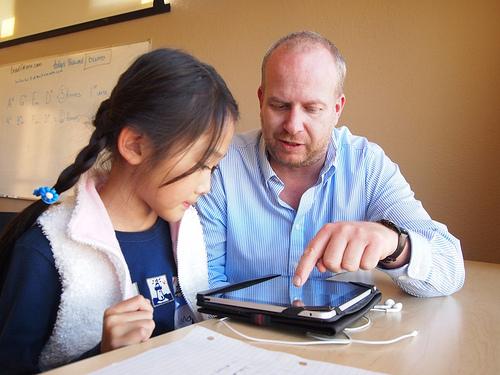
|
Ask Scott Dreyer: Q: What are some good Accommodations for ESL students? A: Several teacher-friends of mine have asked me this question in recent years, especially as more Chinese students are coming to the US to attend middle school or high school. This is a great question. The word “Accommodations” has two meanings in English. It can mean
1. a hotel room or lodging: “Our accommodations were close to the train station,” or: 2. a convenient arrangement; a settlement or compromise. “management was seeking an accommodation with labor” synonyms: arrangement, understanding, settlement, accord, deal, bargain,compromise “an accommodation between the two parties was reached” In this case, we obviously are using the second meaning. And classroom accommodations can be the difference between success and failure for some students. A personal note: “Did you understand what was going on?” we asked her. “I did fine in the music, PE, and math classes. I understood those.” That little girl’s experience in second grade gives us some insights into successful accommodations for ESL students:
– kindness and a welcoming spirit on the part of teachers and classmates – a “buddy” to help the new student fit in and find his or her away around – an assigned seat, by the “buddy,” near the front of class – focus on non-lingual aspects, especially at first (music, PE, math, art)
Some challenges: Without a doubt, international students coming to the US will face many challenges. Because of my background and the focus of DreyerCoaching.com, this blog focuses mainly on Chinese-speakers coming to the US, but many of these principles will apply to students from most any country coming here. Students will obviously struggle with homesickness, culture shock, loneliness, and other challenges during their time here. And to think that many come here in their early or mid-teens–so young!–is remarkable and it must make the transition harder in many ways. Issues such as culture shock require another blog post on another day, but dealing with English is an enormous struggle. Over the past years I have routinely seen students come to the US with a second grade English reading level. When you think that these students are now expected to listen to lectures, read books, do homework, take tests, and participate in class at a grade 8-11 level, then you do not have to have a PhD in educational leadership to realize “there is something wrong with this picture.” Everyone struggles: the student feels bad because they cannot keep up with the work or sometimes even know what is going on. They may feel stupid. Let’s say someone gave me (or you) a page to read in Russian. I cannot read it, not because I am stupid, but because I never learned to read Russian. Same with our students. the teacher feels bad because they want to student to learn and grow, but the student may lack the basic skills. When some students become very frustrated, they may just give up and sleep or play on their phones in class = more teacher frustration. Teachers may also wonder: is this student struggling because of language weakness, or is laziness playing a role? Most teachers (through no fault of their own) have not been trained in ESL skills, and teachers are busy: many fear that if they focus too much attention on one or two ESL students, they risk neglecting the rest of the class. the administrators feel bad because they are caught in the middle. They want all their students to be successful, but there is no magic wand, and some teachers complain about students “not ready for my class.” the parents feel bad, because they are feeling helpless thousands of miles away in their home country, usually they cannot speak English well so they cannot talk with the teachers or host family directly, but they are seeing poor report cards and test scores. Their response is often to berate the child for not working hard enough. the host families feel bad, because they are willing to provide a room, meals, and family experience in the US (already a big contribution), but they are not equipped to provide focused ESL or homework tutoring. Add in that most host families have their own children and homework to worry about, not to mention jobs, mowing the grass, driving to and from soccer, etc., and you see host parents are “stretched to the limit” too. They can and should encourage their guest student to do well in school, but expecting host parents to invest hours each night helping with homework and learning English is probably unreasonable for most situations. The agents feel bad, because they want the students to do well, but the agent is probably in another city like New York or some place and thus unable to help directly. The agent too is “caught in the middle,” with schools telling them the student is ill-prepared, and the family asking “why is my child doing so poorly there?”
Some solutions: Wow, that’s a lot of problems! Thankfully, there are many solutions as well. As stated above, where possible, look for ways to emphasize the NON-language aspects, especially at first. Over time, you can gradually add more linguistic work. International students may be particularly comfortable in art, music, or PE classes, based on their interests. As an administrator, you might want to place that ESL student in an art class, rather than Spanish I. For many Chinese students, they are one to two years ahead of many Americans in math, so math may be relatively easy and a confidence-booster for ESL students. One potential trouble-spot: word problems. But I would like to talk directly to teachers now. You do not have the power to place students in, say, art or music. The student is in your core-curriculum class. What are some options? Here are a few. – Place the student in the front row: better to see and hear, fewer distractions – Place a responsible student nearby as a helper: it may be an American student, or maybe another ESL student who has better English and can help – Offer to let the student audio tape your class. The student can then go home and listen again, if needed – Try to avoid IDIOMS in your speech. This is hard for many of us, but realize idioms can “throw our students for a loop” (confuse them). Let’s say your students did a great job on a test. Rather than tell them, “I’m tickled to death you all rose to the occasion and hit it out of the park,” say, “I am so happy you did so well on this test.” – Avoid cursive. We Americans take it for granted, but it is undecipherable for many ESL learners. Just this week a Chinese student told me about his frustration in an English class here in the US. “I was trying to write down the essay topic, but I could not read it.” The teacher had–understandably–written the essay prompt in cursive, but the student could not understand it. The same goes for cursive notes he tries to borrow from classmates: unintelligible. Interestingly, my wife told me that students in Taiwan learn to read cursive, which is good, but our student said that is not taught in English classes in Mainland China; they only learn to read printed letters there. (If you have time, you might want to include some cursive lessons in your curriculum, or at the least, give your students a copy of a cursive alphabet so they can learn it on their own.) – Hold your student to high behavior standards, the same as your non-ESL students: no phone-surfing in class, no head on desk. Do not make excuses for or enable poor or insubordinate behavior. – Do not be afraid to assign your ESL student different tasks. Remember that “fair” is not always the same as “equal.” For example, maybe you assign your class to read ten pages and answer five questions. But maybe you can assign your ESL student to read four pages and answer three questions. Is that “equal”? No, you are asking different things of different people. But is it “fair”? I think it can be, because of different ability levels. (See also “Animal School,” a story teachers have been talking about since I guess the 1940’s or so, but to not much effect.) – For example, a grade 11 student just arrived from China was struggling with a document-based question (DBQ) in US history. The topic involved the worldview and values of the Puritans, so most of the documents had “King James English” from the early 1600’s. Plus, the very content was alien to a student from atheistic China. These readings are hard for American students, let alone an ESL student. So, this teacher made an accommodation. The student had to do the assignment, but instead of using all dozen or so documents, he just used one: a map of a Puritan village. (High on visuals, low on text.) He saw the church in the middle of town and realized “Christianity was important.” He saw the schoolhouse there too and realized “education was important.” He saw the Village Green and Meeting House and realized “community and democracy were important,” etc. Result? 20/20 on his paper. As time goes on, more documents can gradually be added to each DBQ. Maybe two in the 2nd 9 weeks, three in the 3rd, etc. – Maybe you are studying Germany in history or geography. Instead of the traditional “5-paragraph essay” about Germany, maybe your student could play a violin piece by Beethoven or Mozart for the class, and tell a bit about the piece or musician? – Among the 4 language modes–listening, speaking, reading, and writing–writing is the hardest. Think of little children: they learn to listen first, then speak, read, and writing comes last. Similar for our ESL learners, in some ways. Back to the Germany essay: What if Li doesn’t play the violin? Maybe he can create a poster board about Germany with photos and facts and tell the class about it. Still too daunting? Maybe he can explain the project to you in private outside of class some day. Or he can bring in some apple strudel and coffee? (That will help his popularity with his classmates!) Be creative. – Be flexible. A history teacher emailed me this about a Chinese student: “His ability to write his thoughts is severely limited. When I talk to him, he can express his ideas much better. He sometimes uses drawings to supplement his written work, which I think is great. It helps me to see what he is thinking. Some of this may be a vocabulary issue.” I commend this teacher for being flexible enough to let his student draw and explain some of his answers. And yes, it’s definitely a vocabulary issue. (Does a student need 1 on 1 vocabulary help? See how DreyerCoaching.com can help you.) – Testing: instead of essay answers, maybe try multiple choice with your ESL students. For fill-in-the-blank, provide a word bank to pull from. Consider giving your student more time to finish tests, taking them with you during your planning period in case of questions, or even taking the test home and using the book. – Be available: let your student (and the host family) know of days you are available for any tutoring or to answer questions before or after school. – Sometimes, you have to “face the facts” and realize there is a large gap. Bridging this gap may take some creativity. I know of one student with a grade 2-3 reading level, who was struggling in a middle school Bible class with deep theological and Greek terms. Wisely, I believe, that student was quietly moved to a grade 6 Bible class, which consisted mainly of reading Bible stories. The student flourished, and learned some key Bible concepts and allusions just from the stories and discussions. Another student had roughly a grade 5-6 reading level, but was in a class reading high school-level novels. That teacher simply accepted her student “where he was at,” and let him work on the grade 5-6 workbooks in class, and she checked his classwork and homework in private. (Note: to avoid potential embarrassment from other students screaming out, “Why is the new kid using a third grade book?!”, buy an inexpensive book cover.) The teacher can still (and should) assign homework and give grades; they are just not the same tasks as the non-ESL students have.)
These accommodations are not to be a long-term “crutch” or enabling device. Nor are they to be used to cover for laziness. As time goes one, the workload can gradually be increased and “mainstreamed,” with the goal of helping the student reach grade-level work as soon as possible. But in those first few semesters and years, some additional support is usually necessary. And yes, I said “years.” If a student comes to you with an elementary-reading level, he or she will not be at grade level after a few months and a few “silver bullets.” It will take time and effort and patience, but it is possible and very much worth it! This topic is broad, so this post does not claim to be “exhaustive.” For some more ESL accommodations, click here. What if we need outside help? There will be many times with outside help is needed. Everyone is doing their best, but your staff is busy and over-committed. Everyone is working hard, yet struggling to see your international students succeed. That’s where we can help you. A Success Story A Chinese student came to an independent school in our city about two years ago. She was mature, ambitious, and diligent, but her lack of English skills hampered her work. Furthermore, she had a hard time expressing some of her questions to her teachers, and her teachers were not sure she had understood all their answers or explanations. She was in a highly academic school with rigorous expectations, and she was struggling. Disturbed by their teachers’ and student’s frustration, the school administrators asked the student’s agent for help. That agent then told them about DreyerCoaching.com and me, and how I could help. We quickly set up a meeting where I went to the school and met the student, some administrators, and some teachers. After everyone expressed their concerns and goals, we decided on a simple plan: the student and I would meet two hours a week, after school, for focused, intensive tutoring. Since I speak Chinese, the student and I could easily discuss her school work and particular issues. Plus, having helped Chinese people with English since 1989, I could quickly pin-point her common mistakes and explain how to fix them. Since her parents spoke no English and no one on staff at the school spoke Chinese, I was able to arrange and translate for some online chats between the parents and principals, to everyone’s seeming relief. The content of our weekly classes varied, based on the student’s needs that week. Sometimes we worked on some homework or an essay she had been assigned. Many times we worked through Test of English as a Foreign Language (TOEFL) essay topics I had assigned her. Sometimes we worked through TOEFL or SAT review books. During her senior year, we mainly worked on her college application essays and her senior thesis, a HIGHLY rigorous assignment that required copious research, a twenty-page paper with documentation, and a public defense with Q&A. We worked together during her junior and senior years, and it was great: she took the Test of English as a Foreign Language (TOEFL) three times, gaining about 10 points each time, with a final score of 95. She was accepted to six fine universities, including the highly competitive Virginia Tech architecture program, which she turned down to study art up New York. It is hard to express how gratifying it was to watch her read her twenty-page senior thesis in practically flawless English, handle questions deftly, and later see her and meet her parents at her going-away party and graduation ceremony. Take the next step Do you have international students on your campus now who could benefit from some intensive, individualized help? We can help! From our headquarters in beautiful Roanoke, Virginia, we offer professional ESL services with veteran teachers, native speakers of American English, to anywhere in the world over the internet. EVEN BETTER: Do you have students planning to attend the US in the future? Get them involved with our tutoring NOW, while they are still at home, so they can become used to speaking with Americans before they arrive. Many of our students have told us how their tutoring while still at home helped them have a smoother and more successful transition to a US school. In this video (in Mandarin), Benny from Beijing explains how his online experience with DreyerCoaching.com helped him prepare for his successful high school years in Roanoke, Virginia. Are you a student, teacher, parent, school administrator, or agent? Do you want help with your international students? We can help you! Email Scott at scott@dreyercoaching.com, obligation-free, to get started today!
**********************************************************************************
Happy Ending! Kyle from China with his American friends, graduating from high school!
Happy Ending: Graduation night! |


